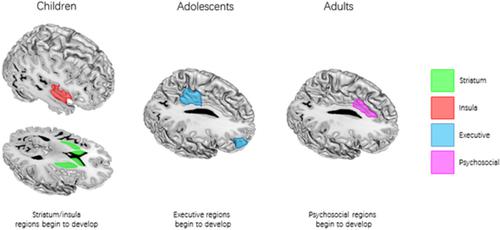当前位置:
X-MOL 学术
›
Hum. Brain Mapp.
›
论文详情
Our official English website, www.x-mol.net, welcomes your feedback! (Note: you will need to create a separate account there.)
Spatial migration of human reward processing with functional development: Evidence from quantitative meta-analyses.
Human Brain Mapping ( IF 4.8 ) Pub Date : 2020-07-07 , DOI: 10.1002/hbm.25103 Zachary A Yaple 1 , Rongjun Yu 1, 2 , Marie Arsalidou 3, 4
Human Brain Mapping ( IF 4.8 ) Pub Date : 2020-07-07 , DOI: 10.1002/hbm.25103 Zachary A Yaple 1 , Rongjun Yu 1, 2 , Marie Arsalidou 3, 4
Affiliation

|
Functional magnetic resonance imaging (fMRI) studies have shown notable age‐dependent differences in reward processing. We analyzed data from a total of 554 children, 1,059 adolescents, and 1,831 adults from 70 articles. Quantitative meta‐analyses results show that adults engage an extended set of regions that include anterior and posterior cingulate gyri, insula, basal ganglia, and thalamus. Adolescents engage the posterior cingulate and middle frontal gyri as well as the insula and amygdala, whereas children show concordance in right insula and striatal regions almost exclusively. Our data support the notion of reorganization of function over childhood and adolescence and may inform current hypotheses relating to decision‐making across age.
中文翻译:

具有功能发展的人类奖励处理的空间迁移:来自定量元分析的证据。
功能磁共振成像 (fMRI) 研究表明奖励处理中存在显着的年龄依赖性差异。我们分析了来自 70 篇文章的总共 554 名儿童、1,059 名青少年和 1,831 名成人的数据。定量荟萃分析结果表明,成年人参与了一系列扩展区域,包括前扣带回和后扣带回、岛叶、基底神经节和丘脑。青少年参与后扣带回和额中回以及岛叶和杏仁核,而儿童几乎完全在右岛叶和纹状体区域表现出一致性。我们的数据支持童年和青春期功能重组的概念,并可能为当前与跨年龄决策相关的假设提供信息。
更新日期:2020-09-03
中文翻译:

具有功能发展的人类奖励处理的空间迁移:来自定量元分析的证据。
功能磁共振成像 (fMRI) 研究表明奖励处理中存在显着的年龄依赖性差异。我们分析了来自 70 篇文章的总共 554 名儿童、1,059 名青少年和 1,831 名成人的数据。定量荟萃分析结果表明,成年人参与了一系列扩展区域,包括前扣带回和后扣带回、岛叶、基底神经节和丘脑。青少年参与后扣带回和额中回以及岛叶和杏仁核,而儿童几乎完全在右岛叶和纹状体区域表现出一致性。我们的数据支持童年和青春期功能重组的概念,并可能为当前与跨年龄决策相关的假设提供信息。



























 京公网安备 11010802027423号
京公网安备 11010802027423号